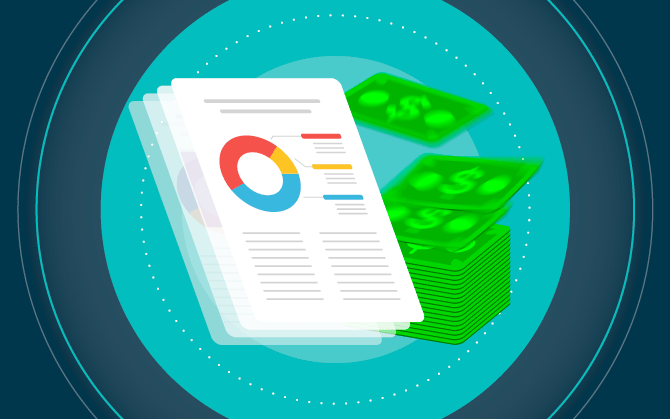
Why is financial planning so important?
Understand why it’s so fundamental to keep your finances organized.

What will we see in this post
Financial planning can be considered one of the main pillars for the development of any business, and digital businesses are no exception.
Even if digital products cost significantly less when compared to physical products or services provided on site, entrepreneurs cannot forgo control of their finances.
Keep in mind that even before you open your digital business, you should have a clear idea of how much you’ll need to invest in order to put it into practice.
In addition, it is also necessary to calculate the budget to keep your activities in control until your business becomes profitable and can stand on its own legs.
Stay tuned a little longer and get answers for your main questions about financial planning. By understanding the tips we’ll present below, odds are your business will have a solid future ahead.
What is financial planning?
Financial planning is, in short, a business management tool.
In practice, planning means making choices in the present in pursuit of certain results in the future.
Overall, the financial planning of a business is based on the definition of short, medium and long-term objectives and goals.
As you might have noticed, this tool offers a guideline for entrepreneurs. In this manner, as they put their sales strategies in motion, for example, it is possible to compare the achievements with what was actually planned.
Thus, if the accomplishments are below expectations, it’s a sign that actions must be taken in order to correct the course of the business.
But if the results do correspond to what was planned, the entrepreneur can prove that he was able to meet the goals.
What is the importance of financial planning for your business?

Financial planning is key so that entrepreneurs have a grasp on how their cash flow is doing, so they can manage their working capital and determine the level of business growth.
When this information isn’t clear, your decision-making process is affected.
It’s like driving through fog.
In this situation, it’s harder to drive since your attention has to be redoubled. After all, the driver’s vision will be quite limited. As a consequence, the driver’s ability to react is reduced.
This scenario can be compared to an entrepreneur managing a business without financial planning.
What are the main characteristics of financial planning?
The financial planning of a business can also be understood as a process since it has a starting point, but not necessarily an ending point.
Do you know why?
The results obtained in a plan serve as the basis for the creation of the next plan and so forth.
Below, you will see what should be taken into account when preparing a financial plan.
Assessment of the current financial situation
Whether before you take your business off the ground (when you need to create a business plan to attest the commercial viability of the idea) or during the development of a new plan for the next cycle, it’s always key to make a financial diagnosis of your business.
If you don’t have this information at hand, planning comes down to mere guesswork.
On the other hand, when you have accurate financial data of the business, it becomes easier to outline goals that are possible to be achieved.
Tracking metrics
The level of sales revenue, production costs, net profit and return on investment (ROI), for example, are a few of the metrics used in financial planning.
With this data, entrepreneurs can perform their business’ financial control and thus, prevent a negative balance.
Time Period of the Plan
The plan can be understood as the result of a planning process. Therefore, a financial plan needs to have a deadline.
By defining this, you select the strategies that are suitable for this period.
That way, you avoid becoming frustrated with goals that need a long time to be achieved.
What are the advantages of financial planning?
Financial planning offers, as its great benefit, anticipated decision-making. This way, you can protect yourself against choices made impulsively, based purely on intuition.
Another benefit of this tool is the construction of a sustainable business model that is able to establish itself in the market, once the revenues are sufficient to pay expenses and also generate profitability.
Keep in mind that, by always having the control of the business’ finances at hand, you’ll be able to have more efficient management of the resources and thus, avoid waste.
4 tips on how to create a financial plan
Now that you’ve understood the importance of financial planning, you’ll learn how to create one for your business. Shall we get started?
1. Analyze the context
Before creating a plan for your business’ finances, evaluate the current context of your market niche and the economy as a whole.
With this, you’ll be able to establish realistic goals for your work.
2. Learn more about financial education
You should know that your level of knowledge about financial education is directly linked to your performance as an entrepreneur.
Several people focus on the development of a digital product but sometimes forget to dedicate themselves to the business’ management.
As a consequence, the chances of achieving good results are reduced. Therefore, don’t forgo your financial education.
3. Project possible scenarios
Don’t become a hostage of only one plan. Having aces up your sleeve for adverse situations and also being prepared for higher growth than what was originally planned.
By projecting various scenarios and knowing how to act in each one, you gain in response time. That way, your business can take advantage of opportunities in each context.
4. Record your financial transactions
Cash flow, or in layman’s terms, the recording of all of your business’ revenues and expenses is essential for effective financial planning.
Only with the control of your financial transaction will you know exactly whether your business makes a profit or a loss.
Setting up a smart financial plan
As you may have noticed, financial planning is of major importance for the sustainable growth of a digital business.
Keep in mind that this process is continuous in the management of your business. Thus, you should always compare what was planned with what has been executed in order to improve your sales and cost strategies and thus, optimize the use of financial resources.
Never forgo your planning, because your success as an entrepreneur depends on it.
By closely following the cash inflow and outflow of your business, you take control of its management, and therefore, you are able to make decisions that are more accurate.
Would you like to become a successful entrepreneur? Well then, check out our post on essential skills they need.




